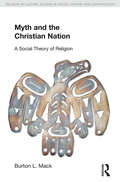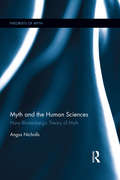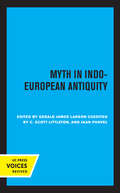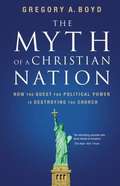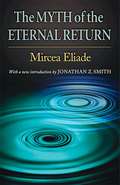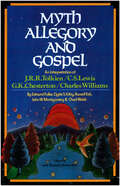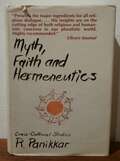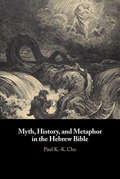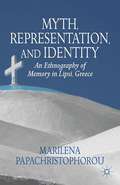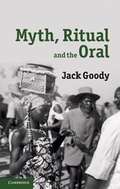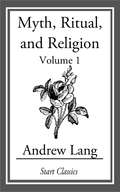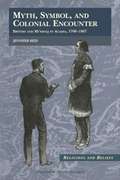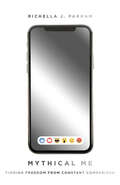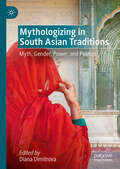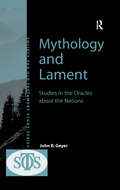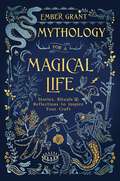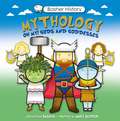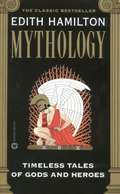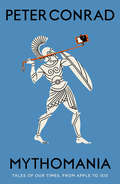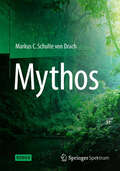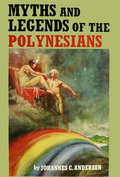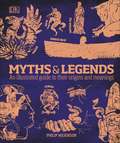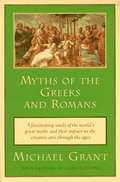- Table View
- List View
Myth and the Christian Nation: A Social Theory of Religion (Religion in Culture)
by Burton L. MackAmerica is widely regarded as the ultimate "Christian Nation." Religious language has always been at the forefront of American politics but this has increased since the events of 9/11. 'Myth and the Christian Nation' presents a startling analysis of how and why Christianity and national identity have been woven together in recent American political discourse. Drawing on examples of religious myth-making across the ancient world 'Myth and the Christian Nation' brings the weight of history to bear on America today, a place where myth, monotheism, sovereignty and power can be harnessed together in the service of specific interests. The book invites readers to rethink the role of religion in the construction of social democracy and to see America afresh.
Myth and the Human Sciences: Hans Blumenberg's Theory of Myth (Theorists of Myth)
by Angus NichollsThis is the first book-length critical analysis in any language of Hans Blumenberg’s theory of myth. Blumenberg can be regarded as the most important German theorist of myth of the second half of the twentieth century, and his Work on Myth (1979) has resonated across disciplines ranging from literary theory, via philosophy, religious studies and anthropology, to the history and philosophy of science. Nicholls introduces Anglophone readers to Blumenberg’s biography and to his philosophical contexts. He elucidates Blumenberg’s theory of myth by relating it to three important developments in late nineteenth- and early twentieth-century German philosophy (hermeneutics, phenomenology and philosophical anthropology), while also comparing Blumenberg’s ideas with those of other prominent theorists of myth such as Vico, Hume, Schelling, Max Müller, Frazer, Sorel, Freud, Cassirer, Heidegger, Horkheimer and Adorno. According to Nicholls, Blumenberg’s theory of myth can only be understood in relation to the ‘human sciences,’ since it emerges from a speculative hypothesis concerning the emergence of the earliest human beings. For Blumenberg, myth was originally a cultural adaptation that constituted the human attempt to deal with anxieties concerning the threatening forces of nature by anthropomorphizing those forces into mythic images. In the final two chapters, Blumenberg’s theory of myth is placed within the post-war political context of West Germany. Through a consideration of Blumenberg’s exchanges with Carl Schmitt, as well as by analysing unpublished correspondence and parts of the original Work of Myth manuscript that Blumenberg held back from publication, Nicholls shows that Blumenberg’s theory of myth also amounted to a reckoning with the legacy of National Socialism.
Myth in Indo-European Antiquity (Publications of the UCSB Institute of Religious Studies)
by Gerald James Larson C. Scott Littleton Jaan PuhvelThis title is part of UC Press's Voices Revived program, which commemorates University of California Press’s mission to seek out and cultivate the brightest minds and give them voice, reach, and impact. Drawing on a backlist dating to 1893, Voices Revived makes high-quality, peer-reviewed scholarship accessible once again using print-on-demand technology. This title was originally published in 1974.
Myth of a Christian Nation: How the Quest for Political Power Is Destroying the Church
by Gregory A. BoydArguing from Scripture and history, Dr. Boyd makes a compelling case that whenever the church gets too close to any political or national ideology, it is disastrous for the church and harmful to society. Dr. Boyd contends that the American Evangelical Church has allowed itself to be co-opted by the political right (and some by the political left) and exposes how this is harming the church's unique calling to build the kingdom of God. In the course of his argument, Dr. Boyd challenges some of the most deeply held convictions of evangelical Christians in America - for example, that America is, or ever was, "a Christian nation" or that Christians ought to be trying to "take America back for God."
Myth of the Eternal Return: Cosmos and History
by Mircea Eliade Willard R. TraskThis founding work of the history of religions, first published in English in 1954, secured the North American reputation of the Romanian émigré-scholar Mircea Eliade (1907-1986). Making reference to an astonishing number of cultures and drawing on scholarship published in no less than half a dozen European languages, Eliade's The Myth of the Eternal Return makes both intelligible and compelling the religious expressions and activities of a wide variety of archaic and "primitive" religious cultures. While acknowledging that a return to the "archaic" is no longer possible, Eliade passionately insists on the value of understanding this view in order to enrich our contemporary imagination of what it is to be human. Jonathan Z. Smith's new introduction provides the contextual background to the book and presents a critical outline of Eliade's argument in a way that encourages readers to engage in an informed conversation with this classic text.
Myth, Allegory, and Gospel: An Interpretation of J.R.R. Tolkien, C.S. Lewis, G.K. Chesterton, Charles Williams
by John Warwick MontgomeryIf you are a "fan" of the fantasy books by Tolkien, C.S.Lewis, Charles Williams or Chesterton, then this is a book worth reading. It is a collection of essays by various authorities in literature, myth and theology. A couple of the contributors were acquainted with either Tolkien or Lewis. The central thesis running through this collection of essays is that mythic symbols found in folk-tales and religious rituals, all express a common, fundamental human yearning for healing and a return to a "lost paradise". The essayists draw on insights from religious phenomenology, Jungian analysis, Christian theology and literary interpretation to tease out the potent mythic symbols found in the writings of Tolkien, Lewis, Chesterton and Williams. Lewis, Williams and Tolkien were associated with one another as drinking partners in an informal literary club known as The Inklings. The essayists "test" their thesis about the power of myth to reveal our search for meaning through the novels of the Inklings. The essayists take us a step further to consider the Christian world-view that informed and shaped the writings of Tolkien, Lewis, Williams and Chesterton. Although a couple of the essays are slightly "dated", anyone interested in fantasy literature would find the thesis very absorbing. It should be useful not merely to students of English literature but also to the general reader who might like to know more about the backdrop to The Lord of the Rings, Narnia, etc. Certainly a book to add to your list for reading if you enjoyed the novels!
Myth, Faith and Hermeneutics: Toward Cross-Cultural Religious Understanding
by Raimundo PanikkarBook by Raimundo Panikkar
Myth, History, and Metaphor in the Hebrew Bible
by Paul K.-K. ChoThis book examines the long-debated issue of the relationship between the Hebrew Bible and ancient Near Eastern myths. Using an innovative, interdisciplinary methodology that combines theories of metaphor and narrative, Paul Cho argues that the Hebrew Bible is more deeply mythological than previously recognized. Because the Hebrew Bible contains fragments of the sea myth but no continuous narrative, the study of myth in the Hebrew Bible is usually circumscribed to the level of motifs and themes. Cho challenges this practice and demonstrates that the Hebrew Bible contains shorter and longer compositions studded with imagery that are structured by the plot of sea myths. Through close analysis of key Near Eastern myths and biblical texts, Cho shows that myth had a more fundamental influence on the plot structure and conceptual framework of the Hebrew Bible than has been recognized.
Myth, Representation, and Identity: An Ethnography of Memory in Lipsi, Greece
by M. PapachristophorouLipsi forms a modern construction that has disconnected from its past. Recently, the community has formed a collective identity reconstructed from fragments of collective memory. This book is an ethnographic account of the mythology proposed by the community and examines how history and collective memory tightly interconnect.
Myth, Ritual and the Oral
by Jack GoodyIn Myth, Ritual and the Oral Jack Goody, one of the world's most distinguished anthropologists, returns to the related themes of myth, orality and literacy, subjects that have long been a touchstone in anthropological thinking. Combining classic papers with recent unpublished work, this volume brings together some of the most important essays written on these themes in the past half century, representative of a lifetime of critical engagement and research. In characteristically clear and accessible style, Jack Goody addresses fundamental conceptual schemes underpinning modern anthropology, providing potent critiques of current theoretical trends. Drawing upon his highly influential work on the LoDagaa myth of the Bagre, Goody challenges structuralist and functionalist interpretations of oral 'literature', stressing the issues of variation, imagination and creativity, and the problems of methodology and analysis. These insightful, and at times provocative, essays will stimulate fresh debate and prove invaluable to students and teachers of social anthropology.
Myth, Ritual, and Religion: Volume One
by Andrew LangAndrew Lang (1844-1912) was a prolific Scots man of letters, a poet, novelist, literary critic and contributor to anthropology. He now is best known as the collector of folk and fairy tales. He was educated at the Edinburgh Academy, St Andrews University and at Balliol College, Oxford. As a journalist, poet, critic and historian, he soon made a reputation as one of the ablest and most versatile writers of the day. Lang was one of the founders of the study of "Psychical Research," and his other writings on anthropology include The Book of Dreams and Ghosts (1897), Magic and Religion (1901) and The Secret of the Totem (1905). He was a Homeric scholar of conservative views. Other works include Homer and the Epic (1893); a prose translation of The Homeric Hymns (1899), with literary and mythological essays in which he draws parallels between Greek myths and other mythologies; and Homer and his Age (1906). He also wrote Ballades in Blue China (1880) and Rhymes la Mode (1884).
Myth, Symbol, and Colonial Encounter: British and Mi'kmaq in Acadia, 1700-1867
by Jennifer ReidThis historical analysis of colonial Acadia from the perspective of symbolic and mythic existence will be useful to those interested in Canadian history, native Canadian history, religion in Canada, and history of religion.
Mythical Me: Finding Freedom from Constant Comparison
by Richella ParhamIVP Readers' Choice AwardDo you ever find yourself stuck in the comparison trap?Speaker and author Richella Parham knows what this feels like. "I couldn't break free from admiring one person's achievements, someone else's personality, another's skills, yet another's relationships. And don't get me started on how I looked at other people's appearances," she writes. "I was haunted by the admirable attributes of other people, certain that I could never match their worthiness. No matter how well-intentioned the teaching or pithy the advice, I found that most of it didn't help me change my thoughts, feelings, or actions."While there are no easy answers, Parham has identified cultural and spiritual myths about others, God, and ourselves that keep us trapped. From there the journey is a spiritual one. We can pick up practices that help us walk in the freedom of Christ with confidence in ourselves. If you've ever suffered from tortured moments of comparison on Facebook, in the office, or in the hallway at church, you'll benefit from this fresh perspective.
Mythologies of the Prophet Muhammad in Early Modern English Culture
by Matthew DimmockThe figure of 'Mahomet' was widely known in early modern England. A grotesque version of the Prophet Muhammad, Mahomet was a product of vilification, caricature and misinformation placed at the centre of Christian conceptions of Islam. In Mythologies of the Prophet Muhammad in Early Modern English Culture Matthew Dimmock draws on an eclectic range of early modern sources – literary, historical, visual – to explore the nature and use of Mahomet in a period bounded by the beginnings of print and the early Enlightenment. This fabricated figure and his spurious biography were endlessly recycled, but also challenged and vindicated, and the tales the English told about him offer new perspectives on their sense of the world – its geographies and religions, near and far – and their place within it. This book explores the role played by Mahomet in the making of Englishness, and reflects on what this might reveal about England's present circumstances.
Mythologizing in South Asian Traditions: Myth, Gender, Power, and Politics
by Diana DimitrovaThis book deals with the issue of mythologizing in South Asian traditions. It brings together a number of essays dealing with the interface between mythology, gender, politics, and nationalism. The common thread that links the chapters is the appropriation and reinterpretation of myth, and its weaponizing for the purpose of power or political gain. All chapters explore the various aspects of the ongoing process of re-mythologizing of the present, as revealed in South Asian traditions. The essays in this collection respond to the same question: how to interpret the present? What is the meaning of ancient and venerated myths today? What are the ideological implications of the interpretation of myths and how do they reflect and influence the power structures of contemporary societies in South Asia?
Mythology and Lament: Studies in the Oracles about the Nations (Society for Old Testament Study)
by John B. GeyerThe oracles about the nations in Isaiah, Jeremiah and Ezekiel originate in the ancient Laments. Ultimately, they were preserved because of their relevance to the Year of Jubilee, with its origins in the New Year Festival; this study illuminates their intention. In Mythology and Lament, John Geyer shows the oracles belong to the sphere of worship, making a theological (mythological) statement, not a political one. Relating to current debates about the historicity of the Hebrew Bible, Geyer also provides a theological context to questions of conflict of nations and environmental debates.
Mythology for a Magical Life: Stories, Rituals & Reflections to Inspire Your Craft
by Ember GrantInvigorate Your Craft with Profound Myths & Accompanying Activities Explore the creative depths of myths, fairy tales, and folklore, where you'll gain extraordinary insights about both the world and yourself. Featuring more than a dozen amazing tales and their related spells, meditations, and affirmations, Mythology for a Magical Life shows you how to elevate your practice in ways you never imagined. These stories come from cultures all over the globe, offering you a deep connection to the human experience.Popular author Ember Grant shares an impressive collection of myths, themes, and hands-on activities that enhance your skills and add new energy to your magic. Discover what the story of Cupid and Psyche can teach you about the journey of your soul. Learn how trickster folklore can inspire you to seize new opportunities in your life. Embrace your primal self with the Maid-of-the-Wave's tale. This compulsively readable book enriches your craft through the power of storytelling.
Mythology: Oh My! Gods And Godesses
by Simon Basher Mary BudzikThe myths and stories of the gods and goddesses of the ancient world have a timeless appeal that captures the attention of generation after generation of children. Basher History: Mythology is an information-packed introduction to Greek/Roman, Norse and ancient Egyptian mythologies. Meet Zeus, father of the Greek gods (and learn that the Romans knew him as Jupiter), Norse Freyja, goddess of love, beauty, war and death, and Egyptian Bastet, goddess of cats, along with many others. Thisunique and upbeat guide is a legend in the making.
Mythology: Timeless Tales of Gods and Heroes
by Edith HamiltonA collection of Greek and Roman myths in the form of stories categorized under seven parts.
Mythomania: Tales of Our Times, from Apple to Isis
by Peter ConradWeaves ancient myth into modern celebrity and consumerist culture to expose the absurdity and occasional insanity of twenty-first-century society, economy, and politics Despite a proclaimed respect for scientific reason, humans are still as intrigued by myth as their remote ancestors. Laptops and smartphones are sold under a logo that invokes the forbidden fruit of the Garden of Eden; skimpily clad classical nymphs cavort in TV reality shows; Narcissus makes a comeback whenever we snap a selfie. Mythical creatures such as handsome vampires abound in best-selling novels. Myth has also invaded the political realm, now that terrorists brandish black flags and recite theological mantras as they martyr themselves. In twenty-seven self-contained entries, Conrad illuminates in his own remarkable way subjects from the British Queen to the Kardashians, via Banksy, vaping, and the inception of the Large Hadron Collider. In Judge Judy, he shows a matronly Roman goddess dispensing justice with a fly swatter. In the metamorphosis of Caitlyn Jenner from Olympic athlete and paterfamilias into idealized female form, he finds parallels to the transformations of the residents of Mount Olympus. Myths used to tell us where we came from. Now, alarmed but also elated by the pace of change in our society, we need them to tell us where we are going.
Mythos
by Markus C Schulte von DrachEine Expedition ins Herz des Dschungels. Eine Reise an den Anfang und das Ende des Glaubens. Eine abenteuerliche Auseinandersetzung mit der Religion und der Evolution. Im Jahr 1539 begegnet der spanische Konquistador Juan de la Torre im Amazonasdschungel dem Teufel. Als fast 500 Jahre später die deutsche Schriftkundlerin Nora Tilly im Indienarchiv von Sevilla auf Dokumente des Spaniers stößt, entdeckt sie Hinweise auf einen Inka-Schatz. Doch bald muss sie feststellen, dass sie nicht die einzige ist, die sich auf den Weg macht, um das Gold zu finden. Die irische Journalistin Brea MacLoughlin reist mit einer Delegation katholischer Geistlicher ebenfalls nach Peru, um ein angebliches Wunder in den Anden zu überprüfen. Zu dieser Delegation gehört auch der junge Priester Arnaud d'Albret, der in Südamerika über eine ihm verbotene Liebe hinwegzukommen hofft. Nach dem gewaltsamen Tod seines Mentors schließt d'Albret sich Nora Tilly an. Auch Brea MacLoughlin folgt der Expedition der Schatzsucher. Im Dschungel Perus entdeckt unterdessen der Biologiestudent Francisco Pérez etwas, das eigentlich nicht existieren dürfte: das fünfzehn Millionen Jahre alte Fossil eines Riesenkrokodils, in dessen Schädel eine Pfeilspitze steckt. Der Versuch, dieses Rätsel zu lösen, führt ihn schließlich mit den Schatzjägern aus Europa zusammen. Doch was die Expedition im Dschungel erwartet, ist nicht nur das Gold der Inka. Tief im Wald stoßen sie auf etwas, das ihr Weltbild in Stücke reißt. ......... "Eine abenteuerliche Melange aus Dawkins' Gotteswahn, Indiana Jones und Jurassic Park. Schulte von Drach gelingt, was Dan Brown nie schaffte: den Leser zu fesseln, ohne seinen Verstand zu lähmen. Absolut empfehlenswert!" Michael Schmidt-Salomon, Philosoph und Schriftsteller, Vorstandssprecher der Giordano-Bruno-Stiftung, Autor von "Jenseits von Gut und Böse" "Wie viel Menschenwerk steckt in der Religion? Im Unterschied zum ätzenden Stil neoatheistischer Gotteswahn-Polemik setzt dieses Buch auf eine Strategie à la Umberto Eco: Der Reigen religionskritischer Überlegungen ist eingepackt in eine Rahmenhandlung, deren Spannung - Science-Fiction und Thriller im besten Sinn - den Leser mitnimmt zu den Etappen der intellektuellen Auseinandersetzung." Christian Kummer, Biologe, Philosoph und Jesuit, Professor an der Hochschule für Philosophie in München, Autor von "Der Fall Darwin" _____ Terra X und Theodizee, Evolution und El Dorado, Schatzjagd und Gottessuche - Markus C. Schulte von Drachs neuer Roman entführt Sie auf eine abenteuerliche Reise um die halbe Welt und zurück bis ins 16. Jahrhundert: Von Sevilla, Kismayoo, Florida und Iquitos aus machen sich seine Helden auf den Weg ins Herz des Amazonas-Regenwaldes. Auf der Suche nach dem legendären Inka-Gold, einem unglaublichen Fossil und ihrem Seelenfrieden stoßen ein französischer Priester, eine deutsche Schatzjägerin, eine irische Journalistin, ein peruanischer Biologiestudent und ein türkischer Kreationist auf die Spuren des Matararo. Doch gibt es dieses Wesen überhaupt? Lassen Sie sich von den Abenteuern genauso fesseln wie von den Auseinandersetzungen über Religion und Wissenschaft, die diesen Thriller so außergewöhnlich machen. Folgen Sie den unterschiedlichen Persönlichkeiten auf ihrem Weg, bis am Ende alle gemeinsam vor einer einzigen Aufgabe stehen: zu überleben.
Myths & Legends of the Polynesians
by Johannes C. AndersenMyths & Legends of the Polynesians is an account of the history, art and mythology of the Polynesian peoples.The Polynesians had many myths and legends, but through the ages they had been circulated by word of mouth, and not recorded. They were recalled from the vast storehouse of time and memory by the old priests who treasured the old traditions, and by the kahuna or sorcerers who constantly relived the legends and sang the old songs.Polynesians have always had a strong romantic appeal to the outside world, possibly because of their enchanting island surroundings, their simple life and natural graces. Their legends have been woven into rich tapestries in this classic text.Stories of Myths and Legends of the Polynesians include:Koropanga and RukutiaKelea and KalamakuaUenukuFairies and TaniwhaThe Tawhaki CyclePele the Fire-GodessThe Spirit WorldsIo, Tangaroa, and CreationTane' and RongoTHe Areoi Society and and Hula Dance
Myths And Legends: An Illustrated Guide to Their Origins and Meanings
by Philip WilkinsonMyths & Legends retells the stories central to every culture that have been passed down from generation to generation for thousands of years. Coverage extends from the well-known tales of the Ancient Greeks, which hold the key to the origin of such phrases as "Achille's heel," to the lesser-known, but richly colorful, myths of the Americas and the East. Topic spreads explore characters and stories in terms of their cultural, psychological, and religious meanings and show their power, purpose, and influence both in their own time and in today's world. Feature spreads visit the sacred sites that can still be seen today, and underline the importance of themes that appear across cultures and through the centuries. In looking at such universal themes as creation, heroic trials, tricksters' lessons, and death and the afterlife, Myths & Legends investigates how different cultures have addressed questions such as How was the world created? How did man learn to use fire? and Why do we grow old?
Myths Of The Greeks And Romans
by Michael GrantThis work provides an analysis of the influence of the classic myth on the study and execution of artistic and scientific endeavours throughout the ages. The book summarizes all the myths and legends of the lesser Gods and heroes, and traces their origins in historical fact or religious myth. It also shows how myths have continued to evolve throughout the ages.
